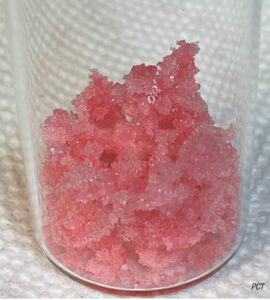 A new solid form of hypochlorous acid (HOCl) is showing promise as a highly effective antimicrobial agent. PCT Ltd. (Little River, S.C.; www.para-con.com) and Onza Corp. (Denver, Colo.; www.onzacorp.com) achieved what is said to be the industry’s first-ever successful “crystallization” of HOCl and rehydration back into liquid HOCl, while maintaining all the chemical properties of the original HOCl. “We entrapped hypochlorous acid between the crystal boundaries and fluid inclusions in an erythritol-based matrix using Stevia in this first test,” explains Paul Mendell, co-founder of Onza. Onza’s proprietary gas-trapping technology enables much easier transport and application of chemical products, since they can be stored as a dry, stable solid rather than in their gaseous form, effectively extending products’ useful life and application range. Onza is also working on gas-entrainment technologies for ozone, nitric oxide, chlorine dioxide and hydrogen sulfide. The crystals were manufactured at Noble Analytical Laboratory in Pampa, Texas by Victoria McDowell.
A new solid form of hypochlorous acid (HOCl) is showing promise as a highly effective antimicrobial agent. PCT Ltd. (Little River, S.C.; www.para-con.com) and Onza Corp. (Denver, Colo.; www.onzacorp.com) achieved what is said to be the industry’s first-ever successful “crystallization” of HOCl and rehydration back into liquid HOCl, while maintaining all the chemical properties of the original HOCl. “We entrapped hypochlorous acid between the crystal boundaries and fluid inclusions in an erythritol-based matrix using Stevia in this first test,” explains Paul Mendell, co-founder of Onza. Onza’s proprietary gas-trapping technology enables much easier transport and application of chemical products, since they can be stored as a dry, stable solid rather than in their gaseous form, effectively extending products’ useful life and application range. Onza is also working on gas-entrainment technologies for ozone, nitric oxide, chlorine dioxide and hydrogen sulfide. The crystals were manufactured at Noble Analytical Laboratory in Pampa, Texas by Victoria McDowell.
After about a week of exposure to air at room temperatures, the team tested the HOCl crystals against non-pathogenic E. colion a stainless-steel surface at an independent laboratory, and the test revealed antimicrobial activity greater than the control (using Stevia alone) — resulting in a 95% reduction in the E. coli colony.
“While this first test proved antimicrobial activity, we plan to improve efficacy. The goal will be to expand the application of hypochlorous acid (and other disinfectants), by offering new, alternative delivery forms and hopefully greater stabilization of otherwise sensitive or unstable compounds,” adds Mendell. Future work will involve analyzing different crystal structures and compositions, and conducting efficacy studies with the U.S. Environmental Protection Agency (EPA).